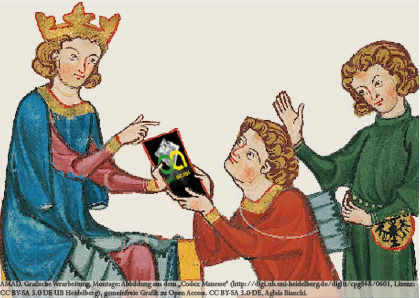AMAD
„Archivum Medii Aevi Digitale - Interdisziplinäres Open-Access-Fachrepositorium und Wissenschaftsblog für Mittelalterforschung‟Zur Einreichung

| Datum: | 2018 |
| Titel: | Lyric form and the charge of forgetfulness in medieval and early modern poetry |
| Autor*in: | Boyar, Jenny (1985 - ) Gross, Kenneth |
| Beschreibung: | Thesis (Ph. D.)--University of Rochester. Department of English, 2016. ; This dissertation reconsiders the creative potentials of technologies of memory in the rise of English lyric poetry. Tracing a chronology of lyric form that emerges through Geoffrey Chaucer and Thomas Wyatt’s mutual development of the English sonnet, I locate origins of lyric voice at moments in which traditionally held beliefs about memory practice come forcefully into question. Memory is typically accepted as fundamental to the production of creative work in the Middle Ages and Renaissance — contrary to later theories that see creativity as arising from a spontaneous burst of inspiration. In medieval and early modern Europe, inventive thought was associated with complex, disciplined practices that faced inordinate expectations of assembly and preservation: from the architectural mnemonics of the Middle Ages to what Donne describes as the “pretty rooms” of the Renaissance sonnet, believed to encapsulate all that is human. I propose that these organizing forms, however lauded in their respective time periods, are exposed as flawed in vernacular translations, which are themselves broader acts of remembrance, beset by a need to innovatively break from the past. My first two chapters concern Chaucer’s Troilus and Criseyde, a translated narrative poem in which innovations of lyric form are introduced, I suggest, at moments in which memory is most compromised and Chaucer, most unhinged from his sources. Whether through allusion to architectural mnemonics, or the embryonic English sonnet of the Canticus Troili, Troilus indicates movement from architectural constructs for memory to what Donne would later describe as the “pretty rooms” of the sonnet; both are among the forms raised throughout Troilus to preserve amatory expression, only to be exposed for their fleetingness. Chapters Three and Four focus on Thomas Wyatt: the sonnet that was in Chaucer’s narrative a brief moment becomes, with the influence of forces like the Reformation and the invention of the printing press, a newly poetic space on the page. Where Chaucer deals with memory on an often elusive plain, Wyatt’s spaces become more localized, in an internalized and directly named rendering of the mind, as well as through — as I explore in my final chapter — the poetic device of the refrain. Yet Wyatt, even as he witnessed a time in which poetic memory reached new understandings, manipulates some of the very forms he introduces into English so as to expose the inevitabilities of forgetting. |
| URI: | https://www.amad.org/jspui/handle/123456789/70867 |
| Quelle: | http://hdl.handle.net/1802/31709 |
| AMAD ID: | 579004 |
| Enthalten in den Sammlungen: | BASE (Bielefeld Academic Search Engine) General history of Europe |

